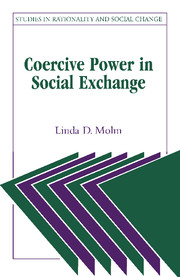Book contents
- Frontmatter
- Contents
- LIST OF FIGURES AND TABLES
- PREFACE AND ACKNOWLEDGMENTS
- 1 Introduction and overview
- 2 Social exchange and power
- 3 Punishment and coercion
- 4 An experimental setting for studying power in exchange relations
- 5 The early research: experimental tests and theoretical puzzles
- 6 The structural determination of power use
- 7 Dependence and risk: structural constraints on strategic power use
- 8 Injustice and risk: normative constraints on strategic power use
- 9 The effects of coercion: compliance or conflict?
- 10 A theory of coercion in social exchange
- 11 Conclusions and implications
- APPENDIX I Definitions of basic concepts of social exchange
- APPENDIX II The experimental instructions for the standardized setting
- REFERENCES
- NAME INDEX
- SUBJECT INDEX
11 - Conclusions and implications
Published online by Cambridge University Press: 06 July 2010
- Frontmatter
- Contents
- LIST OF FIGURES AND TABLES
- PREFACE AND ACKNOWLEDGMENTS
- 1 Introduction and overview
- 2 Social exchange and power
- 3 Punishment and coercion
- 4 An experimental setting for studying power in exchange relations
- 5 The early research: experimental tests and theoretical puzzles
- 6 The structural determination of power use
- 7 Dependence and risk: structural constraints on strategic power use
- 8 Injustice and risk: normative constraints on strategic power use
- 9 The effects of coercion: compliance or conflict?
- 10 A theory of coercion in social exchange
- 11 Conclusions and implications
- APPENDIX I Definitions of basic concepts of social exchange
- APPENDIX II The experimental instructions for the standardized setting
- REFERENCES
- NAME INDEX
- SUBJECT INDEX
Summary
I began this work with two main objectives: theoretically, to determine whether the scope of exchange theory could be extended to include coercive power, and empirically, to compare the effects of reward power and coercive power on social exchange. Chapter 10 reviewed the results of the first effort, by summarizing the theory of coercive exchange developed in the project and evaluating its implications for social exchange theory.
This chapter evaluates the empirical contributions of the project. Here, I review the major substantive findings of the research, examine their implications for social relationships, and consider their relevance for other structures, forms, and conditions of exchange.
The core findings
Six core findings summarize the main conclusions about coercive power in social exchange. Many of these findings are not only nonintuitive, but directly contrary to common beliefs about the use and effectiveness of coercion.
First, coercion is not structurally induced by a coercive power advantage, but purposively enacted as a strategy to increase rewards. While a reward power advantage directly induces the use of that power, actors who use coercion are motivated, instead, by structural conditions that make acquiring rewards problematic. Their use of punishment is not an unintended side effect of other actions or other exchanges. Rather, it is a purposive effort to change a partner's behavior, by creating contingencies that produce negative consequences for the partner's failure to reward them.
- Type
- Chapter
- Information
- Coercive Power in Social Exchange , pp. 266 - 280Publisher: Cambridge University PressPrint publication year: 1997



